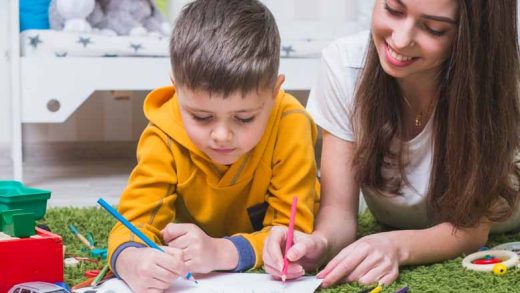Teaching kids to be responsible is key. It helps them grow up to be independent and successful. It starts at home. With steady support and positive words, parents teach lasting responsibility.Understanding a child’s emotional journey and change is very critical for the parents as well as caregivers. Emotions are unique to every person in every situation; but for a child, the journey from developing to managing emotions is crucial. Although children show noticeable emotional patterns after birth, it is from the age of 3 that a child starts developing any major emotion towards the world around it. From then to the age of 5 are years of significant emotional change. Learning about feelings helps kids with their own emotions as well as teaches them how to be careful and thoughtful in what they do. Let us look at the emotional development stages of a preschooler.
Understanding the emotional development of a child
Before understanding the stages of preschool Emotional development of a child, you must understand why it is so critical.
- Building trust and bond:
- Effective parenting or caregiving:
- Supporting mental health and emotional intelligence:
- Behaviour management:
- Preventing behavioural issues:
Understanding a child’s emotional needs, and changes, and empathizing with them creates a sense of understanding between the child and the parent or caregiver. Validating their feelings and showing your support creates a sense of security for the child to open up about their experience. This helps create a bond of trust and dependability for the child.
To respond to a child’s changing emotions the parent or caregiver needs to understand their emotional experience. Once you understand their emotional point of view, you will be able to show them the needed support and provide guidance. This creates a healthy and nurturing environment for the child to feel free to share their experiences and emotional changes.
Very early stages of emotional realizations and changes might be intense and impact a child’s mental health. Thus, being a parent and caregiver it is very important to understand their situation and guide them properly to ease out any distress and provide the needed guidance. This is the time when the adults can effectively teach the children emotional skills early in their lives.
While first understanding emotions, the child might not be completely in control of their emotional expression. Thus, the adults need to understand their situation and guide them towards the right expressions while validating their emotions. This helps the children receive the proper guidance and not be overwhelmed by their emotional changes.
When a child’s emotions are unaddressed or misinterpreted it can lead to outbursts in a negative way such as through aggression, disobedience, and withdrawal. These underlying issues can be avoided by addressing the emotional distress caused to the children before it escalates on a greater level.
Emotional development stages of a preschooler
The day a child is born, there are so many different emotions that it notices within but does not have a clear understanding of. It then identifies some but is not able to manage the reactions. Let us see the journey of emotional development of a child from birth.
- Noticing Emotions:
- Managing Emotions:
- Empathy and Social Skills:
- Coping with change and self-identification:
Beginning from the day they are born till the age of three children start noticing emotions and reacting to them. Such as smiling when they like something, or crying when something is not to their liking. They then start noticing similar emotions in others, such as their mother smiling when they smile, and their father laughing when they do something. This is when the parents and caregivers must create a safe place around the child. This is when a nurturing and supporting environment encourages the child to feel and show their emotions.
From the age of three when children start mingling with peers and other guardians at preschool, they learn to manage their emotions. They start understanding that they are now in front of a broader audience and must control their emotions. This is when the guardians need to reach out to the children and guide them toward proper emotional management. Different activities such as storytelling, music, and art can help with teaching the children emotion management.
As the child moves into a world outside of their homes, it is important to make them accept others and empathise with them. This is only possible if the adults have shown them empathy and support. Thus, at this stage of emotional development, the parent or caregiver must show the children how to understand others and support them. This is also when the child is guided toward self-regulation.
When the child is around peers they start understanding of self-esteem and for an adult, it is crucial to teach how a child conceives themselves. It is important to let the child understand how others can affect his image of himself. Celebrating all achievements and continuous support to express is what is needed during this emotional stage.
Understanding the emotional development of preschoolers is very important in order to provide them with the needed support and guidance. Through the stages of emotional development, the child might feel overwhelmed and lost in understanding the transition. The parents and caregivers will need to understand the situation and support them through validation and guidance. A proper understanding of the emotional development stages helps in creating a free, nurturing environment for the child to express and learn.
Adding understanding feelings to teaching kids about responsibility makes a big difference. Knowing how to deal with their own emotions helps kids learn about being responsible. When they get how feelings work, they make smarter choices and get along better with others. This mix of knowing about emotions and being responsible helps kids tackle life’s ups and downs easier.









